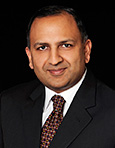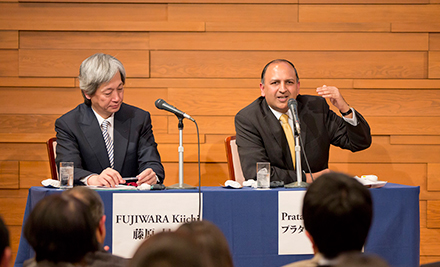This event now concluded. Report available here.
- Lecturer: Pratap Bhanu Mehta
(President & Chief Executive, Centre for Policy Research) - Commentator & Moderator: Fujiwara Kiichi
(Professor, The University of Tokyo Graduate Schools for Law and Politics) - Date: Thursday, January 16, 2014, 6:30 pm
- Venue: Iwasaki Koyata Memorial Hall, International House of Japan
- Seating: 200
- Language: English / Japanese (with simultaneous interpretation)
- Co-organizer: The Japan Foundation
- Admission: Free (reservations required)
Pratap Bhanu Mehta

Dr. Pratap Bhanu Mehta is the president of the Centre for Policy Research, one of India’s most distinguished think tanks in New Delhi. He was previously a Visiting Professor of Government at Harvard University and NYU Law School, and Professor of Philosophy and of Law and Governance at Jawaharlal Nehru University. His areas of research include political theory, constitutional law, society and politics in India, governance and political economy, and international affairs. He has also done extensive public policy work as a member of the Government of India’s National Security Advisory Board, and Member-Convener of the Prime Minister of India’s National Knowledge Commission. He is also a member of the World Economic Forum’s Global Governance Council. His major publication includes The Burden of Democracy (Penguin 2003) and he is also a member of the group which produced Non-Alignment 2.0 (Penguin 2013.)
He is an editorial consultant to the Indian Express and his columns have also appeared in a number of national and international dailies including the Financial Times, Telegraph, International Herald Tribune, The Hindu, and Outlook. He is also on the Editorial Board of numerous journals including the American Political Science Review, and the Journal of Democracy.
Dr. Mehta has a B.A. in Philosophy, Politics and Economics from Oxford University (St. John’s College); and a Ph.D. in Politics from Princeton University. He is the recipient of the Malcolm Adiseshiah Award for 2010 and of the 2011 Infosys Prize for Social Sciences – Political Science.
Report
Dr. Pratap Bhanu Mehta addressed some key aspects of the great social transformation now taking place in India. This pivotal period in India’s modern history has been marked by an interrelated political and economic crisis, he observed.
Dr. Mehta examined the political crisis first, noting that India’s political status quo is breaking down as the public becomes more insistent on government transparency. The remarkable expansion of Indian civil society has called into question the situation up to now, where government officials have had wide discretion, operated in relative secrecy, and been accountable only to their superiors.
Yet no political party—whether ruling or opposition—has been willing to recognize how obsolete the Indian state has become, Dr. Mehta explained, because they are “implicated in the old way of doing things.” The connection between the opposition and the old system has made it difficult for citizens to seek redress through conventional political channels. This in turn has caused many Indians to turn away from politics, particularly members of the growing middle class.
The recent election success of the anti-corruption Aam Aadmi Party (“Common Man’s Party”) in New Delhi seems to be dissolving some of this political apathy, however. Dr. Mehta pointed out that the AAP’s growth has forced other parties to propose more anti-corruption legislation, and also shown that new, clean sources of political funding are feasible. Thanks to this change in the political mood, the upcoming election is addressing issues that have been ignored in previous elections.
After touching on these political developments, Dr. Mehta turned to the economy, which has been slowing down of late. The previous level of over 8 percent annual growth has dropped to below 5 percent, and inflation remains high. The speaker attributed this not only to the global slowdown but to the drop in domestic investment, particularly related to key infrastructure. But Dr. Mehta was optimistic that the worst may be over. The basis for his optimism is the growing political consensus that India can no longer be governed in the old way, an awareness that will put intense pressure on the new government to speedily implement key economic reforms.
Dr. Mehta wrapped up his talk by underscoring the good news that the upcoming election has put reform on the front burner, while recognizing that the opposition has yet to adequately present a specific policy agenda.
Following Dr. Mehta’s remarks, the event’s moderator, Fujiwara Kiichi, a professor at the University of Tokyo, kicked off the Q & A session by asking him whether a defeat of the ruling Congress Party in the upcoming election would be merely a rebuke of the current government; or if it might instead be an important step toward the creation of a new political reality. Dr. Mehta responded by pointing to India’s general tendency—as a result of its great size and federal system—to continue steadily along a reform path, with few reversals, once a general policy direction has been made clear.
Dr. Mehta then fielded a number of other questions, dealing with such topics as the democratic tradition in India, foreign-policy priorities, and investment opportunities and risks in India.
